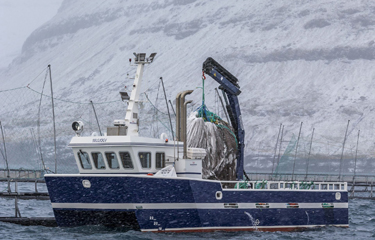Bakkafrost Group has posted total operational earnings before interest and taxes (EBIT) of DKK 102.7 million (USD 16.3 million, EUR 13.8 million) for the third quarter of this year, a decrease of more than DKK 200 million (USD 31.7 million, EUR 26.9 million) from the DKK 303.4 million (USD 48.1 million, EUR 40.8 million) it posted a year previously.
The Faroe Islands-headquartered salmon farmer reported that, while its ability to operate in the Faroe Islands had not been affected by the COVID-19 pandemic in the quarter, and its operations in Scotland had only been mildly affected, the overall salmon market had been impacted by the crisis.
Looking forward, it said that while market dynamics will continue to be affected by the situation, the long-term balances in the world market for salmon products “will most likely remain favorable for Bakkafrost.”
The group made a Q3 2020 profit of DKK 176.8 million (USD 28 million, EUR 23.7 million), down from DKK 180.9 million (USD 28.7 million, EUR 24.3 million). For the first nine months of this year, its profit was DKK 500.5 million (USD 79.4 million, EUR 67.2 million), compared with DKK 582.4 million (USD 92.4 million, EUR 78.2 million) in the corresponding period of 2019.
Bakkafrost’s farming segment delivered an operational EBIT of DKK 96.6 million (USD 15.3 million, EUR 13 million) in the last quarter, down from DKK 231.5 million (USD 36.7 million, EUR 31.1 million) in Q3 2019, with its Scotland (SCT) farming segment making an operating loss of DKK 28.4 million (USD 4.5 million, EUR 3.8 million).
In total, it harvested 21,611 metric tons (MT) gutted weight of salmon in the three-month period, up from 12,938 MT in Q3 2019, with last October’s majority acquisition of the Scottish Salmon Company (SSC) contributing 10,476 MT to the increase. The total harvested volume for the first nine months of this year was 60,424 MT, up from 39,254 MT a year ago. Its harvest guidance for 2020 is 50,000 MT HOG from the Faroes and 39,000 MT in Scotland. SSC has around 60 salmon farming sites across the west coast of Scotland and the Hebridean Islands.
In 2021, Bakkafrost expects to harvest 62,500 MT HOG in the Faroe Islands and 44,000 MT in Scotland. It will also release 14.5 million smolts and 11 million smolts in the two respective regions.
The group’s value-added processing (VAP) segment, which produced 5,313 MT of skinless and boneless portions of salmon, posted an operational EBIT of DKK 21.8 million (USD 3.5 million, EUR 2.9 million) from the last quarter, down from DKK 25.9 million (USD 4.1 million, EUR 3.5 million) in Q3 2019. However, for the first nine months of the year, the operation EBIT was DKK 59.6 million (USD 9.5 million, EUR 8 million), up from DKK 27.1 million (USD 4.3 million, EUR 3.6 million).
Bakkafrost CEO Regin Jacobsen said that in the VAP segment, the supply had been higher than in a normal third quarter due to a strongly increased demand from retail customers in Europe and the United States, and also that sales to Russia had picked up in the quarter.
“During this quarter, the global salmon market has again been affected by the COVID-19 pandemic, putting pressure on the salmon industry and affecting the financial returns across the industry negatively. Throughout the third quarter, we have, however, been able to maintain a steady supply to our customers,” he said.
According to Jacobsen, the biology in the Faroe Islands had performed strongly, and the harvested fish had a good quality.
“This is partly a result of our investments in our ability to produce larger smolts. Our investments in increased hatchery capacity – latest with the completion of the Strond hatchery – has enabled us to increase the average smolt size significantly, and this increase will continue as we have now commenced the expansion of the hatcheries at Norðtoftir and Glyvradalur. In 2022, we expect to reach our target average smolt size of 500 grams,” he said. “We are now able to observe that the high quality of the larger smolts produced has a positive impact on the performance of the smolts released into our marine sites, which in combination with good stewardship and proper care make up good end-results.”
He also confirmed that all salmon now produced by Bakkafrost in the Faroe Islands is certified according to the Aquaculture Stewardship Council (ASC) standard – a goal that the group set itself in 2013.
“With our unique selling points, a flexible value chain, increasing harvest volumes and a tight market outlook for 2021, it is our view that Bakkafrost is in an excellent position,” he said.
Meanwhile, Bakkafrost’s fishmeal, oil and feed (FOF) segment delivered earnings before interest, taxes, depreciation, and amortization (EBITDA) of DKK 69.5 million (USD 11 million, EUR 9.3 million) in the last quarter, down from the DKK 94.5 million (USD 15 million, EUR 12.7 million) achieved in Q3 2019, with its sales of fishmeal reaching 39,869 MT. Some 2,701 MT of this feed was sold to external customers.
Photo courtesy of Bakkafrost







